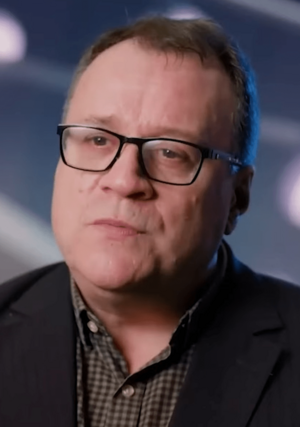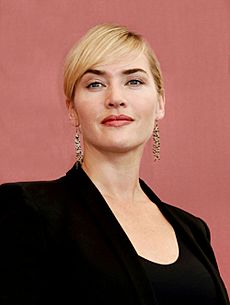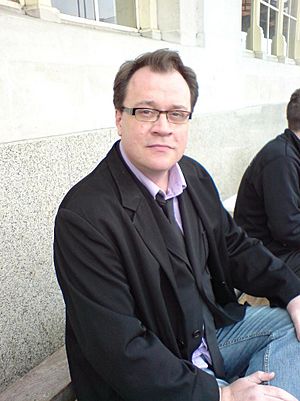Russell T Davies facts for kids
Quick facts for kids
Russell T Davies
OBE FRSL
|
|
|---|---|

Davies in 2024
|
|
| Born |
Stephen Russell Davies
27 April 1963 Swansea, Wales
|
| Alma mater | Worcester College, Oxford |
| Occupation |
|
| Years active | 1986–present |
| Spouse(s) |
Andrew Smith
(m. 2012; died 2018) |
Stephen Russell Davies (born 27 April 1963), known as Russell T Davies, is a Welsh screenwriter and television producer. He is famous for bringing back the BBC science-fiction series Doctor Who in 2005. He was the main writer and showrunner for the show from 2005 to 2010 and returned to the role in 2023.
Davies has created many other popular television shows. These include Queer as Folk (1999–2000), The Second Coming (2003), and Casanova (2005). He also created the Doctor Who spin-offs Torchwood (2006–2011) and The Sarah Jane Adventures (2007–2011). More recently, he created Years and Years (2019), It's a Sin (2021), and Nolly (2023).
Born in Swansea, Wales, Davies first wanted to be a comic artist. He later decided to become a writer for television. After graduating from Oxford University, he started working for the BBC's children's department, CBBC, in 1985. There, he created the shows Dark Season and Century Falls.
In 2005, Davies successfully revived Doctor Who after it had been off the air for many years. With actors Christopher Eccleston and then David Tennant as the Doctor, the show became a huge hit. Its popularity led to the spin-off shows Torchwood and The Sarah Jane Adventures. In 2008, Davies was appointed an Officer of the Order of the British Empire (OBE) for his work in television drama. He returned as the showrunner for Doctor Who in 2023 for the show's 60th anniversary, with David Tennant and then Ncuti Gatwa as the Doctor.
Contents
Early Life and Education
Stephen Russell Davies was born on 27 April 1963 in Swansea, Wales. His parents were both teachers. He was the youngest of three children. From a young age, Davies loved television, especially shows like Doctor Who. One of his earliest memories was watching a Doctor Who episode in 1966. He also enjoyed drawing cartoons and reading comics.
Davies went to Olchfa School in Swansea. He was a creative student and joined the West Glamorgan Youth Theatre Company when he was 14. This helped him develop his talent for storytelling and acting. He originally wanted to be a comic artist, but a teacher told him his colour-blindness might make it difficult. So, he decided to focus on studying English literature at the University of Oxford.
At Oxford, Davies discovered he loved the storytelling in classic books, especially those by Charles Dickens. He continued to write plays for his youth theatre group back in Wales. After graduating, he worked for a short time at the Sherman Theatre in Cardiff. In 1985, a friend suggested he apply for a job as a graphic artist on the children's show Why Don't You?, which started his career in television.
Career in Children's Television
Davies joined the BBC Wales children's department, known as CBBC, in 1985. He started by doing illustrations for the show Why Don't You?. He soon got more work, and in 1986, he was asked to write his first script for the show. His writing was a success, and he became a regular writer and later the producer for Why Don't You?.
While working at CBBC, Davies created two of his own science-fiction series for children.
Dark Season and Century Falls

In 1991, Davies created Dark Season. The show was about three teenagers who uncover a plot by a villain to take over the world using school computers. The series starred a young Kate Winslet in one of her first roles. Dark Season had many ideas that Davies would later use in Doctor Who, such as villains using schools as a base and bringing two main villains together for the finale.
In 1993, he created Century Falls. This series was a bit darker and more mysterious. It told the story of a village where no children had been born for 40 years. A teenage girl named Tess moves to the village and, with her new friends, uncovers the dark secret behind the village's curse. These shows proved Davies was a talented writer of science-fiction and fantasy stories for young people.
Writing for Adult Television
In the mid-1990s, Davies began writing for adult television dramas. He wrote for soap operas and created his own shows that explored interesting and sometimes challenging ideas.
One of his first major projects was The Grand, a drama set in a Manchester hotel in the 1920s. He wrote all 18 episodes of the series. The show looked at the lives of the hotel staff and guests during a time of great change in Britain.
In 1999, Davies created Queer as Folk, a groundbreaking series about a group of friends living in Manchester. The show was a huge success and was praised for its honest and lively characters. It helped to make Davies one of the most respected writers in British television.
After this, he wrote Bob & Rose, a love story about a man who falls in love with a woman, which surprised his friends and family. He also created The Second Coming, a powerful drama about a man who believes he is the Son of God. This series starred Christopher Eccleston, who would later become the Ninth Doctor.
Bringing Back Doctor Who
Davies had been a fan of Doctor Who since he was a child. For years, he had wanted to bring the show back to television. In the late 1990s and early 2000s, he talked to the BBC about his ideas for a modern version of the series.
Finally, in 2003, the BBC agreed to revive Doctor Who. Davies was chosen as the head writer and executive producer. He wanted the new series to be exciting for a new generation of viewers while still respecting the show's long history. His plan was to make the episodes longer, more action-packed, and focused on the Doctor's human companion, who would be the audience's way into the story.
A New Era for the Doctor
The new series of Doctor Who began in March 2005. The first episode, "Rose", introduced Christopher Eccleston as the Ninth Doctor and Billie Piper as his companion, Rose Tyler. The show was an instant hit, attracting millions of viewers.
After one series, Eccleston left the show, and David Tennant took over as the Tenth Doctor. Tennant's version of the Doctor became incredibly popular all over the world. During Davies' time as showrunner, Doctor Who became one of the BBC's biggest and most successful shows. It won many awards, including several BAFTAs.
Davies wrote many of the most famous episodes from this era, including "The Parting of the Ways", "Doomsday", and "Journey's End". He left the show in 2010, with his final story being "The End of Time", where David Tennant's Doctor regenerated into the Eleventh Doctor, played by Matt Smith.
Doctor Who Spin-Offs
The success of Doctor Who led Davies to create two spin-off series.
- Torchwood (2006–2011) was a more adult-oriented science-fiction show. It followed Captain Jack Harkness (John Barrowman) and his team of alien hunters based in Cardiff.
- The Sarah Jane Adventures (2007–2011) was a children's series starring Elisabeth Sladen. She returned as Sarah Jane Smith, one of the most popular companions from the original Doctor Who. The show followed Sarah Jane and a group of teenagers as they investigated alien activity on Earth.
Career After Doctor Who
After leaving Doctor Who in 2010, Davies continued to create acclaimed television dramas.
In 2015, he created three connected series for Channel 4: Cucumber, Banana, and Tofu. These shows explored the lives of different characters in Manchester.
In 2018, he wrote A Very English Scandal, a drama starring Hugh Grant about a real-life political scandal from the 1970s. The following year, he created Years and Years, a series about a family living through 15 years of rapid political and technological change.
In 2021, he wrote It's a Sin, a powerful and emotional series about a group of friends during the HIV/AIDS health crisis in the 1980s. The show was a huge critical success and was praised for its moving story and wonderful characters.
Return to Doctor Who
In September 2021, the BBC announced that Russell T Davies would return to Doctor Who as showrunner. He took over for the show's 60th anniversary in 2023 and for future series.
The 60th-anniversary specials saw David Tennant return as the Fourteenth Doctor, alongside Catherine Tate as Donna Noble. At the end of the specials, Ncuti Gatwa was introduced as the Fifteenth Doctor. Gatwa is the first black actor to play the lead role in the show's history.
Under Davies' leadership, Doctor Who began a new partnership with Disney+, allowing the show to be seen by a global audience. He also created a new spin-off series called The War Between the Land and the Sea, which is expected to air in 2025.
Writing Style
Russell T Davies is known for his ability to mix epic, exciting stories with deep, emotional character moments. His writing often features strong families, close friendships, and a great sense of humour. He is skilled at creating characters that audiences care about deeply.
In Doctor Who, he created thrilling adventures with monsters and aliens, but he always made sure the stories were about people. He focused on the Doctor's relationship with his companions and how traveling in the TARDIS changed their lives. This focus on emotion and character is a key reason for his success.
Davies is also known for writing about important social topics in an accessible way. His shows often celebrate diversity and champion the idea that everyone deserves to be a hero.
See also
 In Spanish: Russell T Davies para niños
In Spanish: Russell T Davies para niños
 | Jessica Watkins |
 | Robert Henry Lawrence Jr. |
 | Mae Jemison |
 | Sian Proctor |
 | Guion Bluford |


